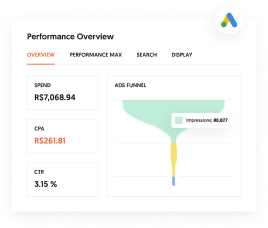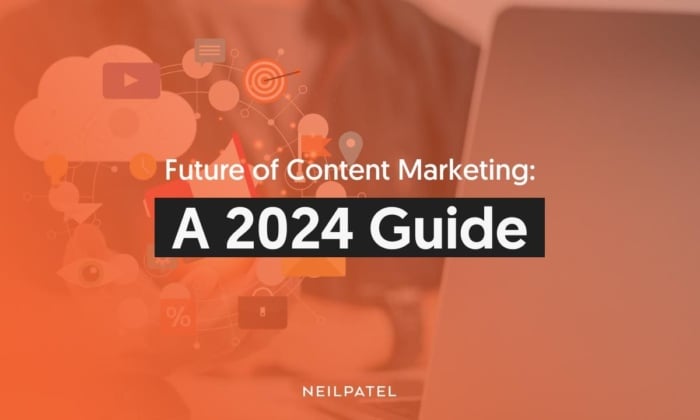
Let’s talk about the future of content marketing.
How’s it doing in 2024? Where might it be headed in the year ahead? Is content still king?
In short, yes, content is still an incredibly valuable part of marketing. It remains one of the best ways to educate your audience and build genuine connections that result in conversions. No wonder 74 percent of B2B content marketing budgets will stay the same or increase in 2024.
But that doesn’t mean the way we do content marketing is going to stay the same.
In this article, I discuss the future of content creation, the four trends I think are shaping the industry right now, and four predictions I think will come true over the next year.
Key Takeaways on the Future of Content Marketing
- AI-generated content is flooding the market, but that will make it even easier for brands that produce high-quality content to stand out from the crowd.
- It’s now just as important to build your brand as it is to improve your SEO. A stronger brand can even improve your rankings.
- Short-form video is arguably the most popular type of content marketing. You’re in the minority if you aren’t using it as part of your strategy in 2024.
- Personalizing content—whether that’s to each individual reader or by adding your unique take—is more important than ever, given the rise of AI content
- SGE is changing search engines, and you need to change your strategy to make sure you are included in its results.
- People will realize AI is much better suited to other content marketing tasks. It will be used throughout the entire content marketing process.
- Trust will become more important as marketers try to forge genuine relationships with their readers.
- Marketers may start to take a social-first approach to content marketing, creating content specifically for social media platforms rather than using them to support blog content.
Content Marketing: 2024 Current Trends
I think four trends are defining content marketing in 2024:
AI-Generated Content Is Flooding the Market
ChatGPT was a revelation in 2022. Fast forward to today, and AI content is everywhere. Even major publications like Sports Illustrated and CNET have started to utilize AI-generated content.
Many publications are adding disclaimers to articles produced entirely or in part by AI as a result:
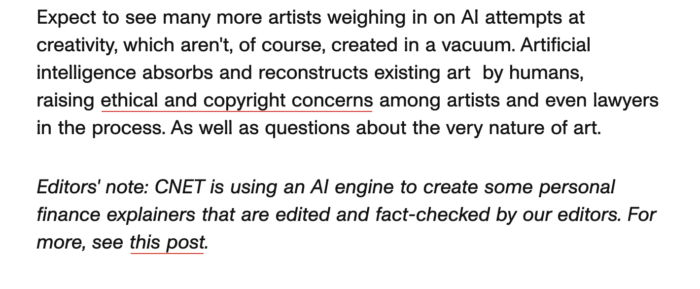
In many ways, it’s understandable brands would use AI as much as possible. ChatGPT and other large language models make it faster and cheaper to create content than ever before.
Unfortunately, the content these tools spit out tends to be generic and, often, ill-informed. It reads well, sure, but the substance of the content leaves a lot to be desired.
Believe it or not, this trend might be a good thing for brands committed to creating quality content. I see a huge opportunity for brands that can prove that genuine humans have contributed to their content. Given the reaction to the publications above, people clearly care that the content they read is written by another human. Combined with Google’s emphasis on E-E-A-T, that could result in a jump in rankings.
Branding and SEO Are Intertwined
In the aftermath of recent Google updates, including the Helpful Content Update and November 2023 Core Update (both of which targeted low-quality content aimed at searchers, not readers), branding and SEO have never been closer.
A solid SEO strategy has always been an effective tool to build brand awareness. But now it works both ways—the quality of your brand can improve your rankings.
That’s why I recommend making your brand as prominent on the SERPs as possible. Don’t just settle for the organic results. Use paid ads to occupy as much real estate as possible like the SaaS payment platform Paddle does:
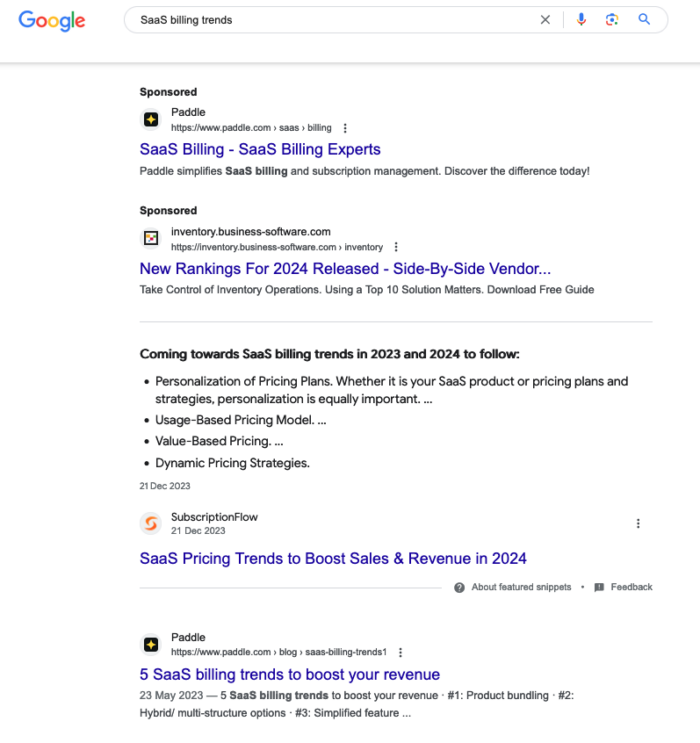
Next, think about tactics that strengthen your brand first and foremost, rather than just improving your SEO. Take establishing a new content silo on your site to become an authority in that space, for example. Customers need to understand your expertise in that area, and by explaining your pedigree on your website, you help Google to better understand your brand, too.
Comparing how your brand presents itself online against competitors can also highlight ways to improve both your website and your SEO. You may find several content gaps between your site and your competitors that are easy to close while boosting rankings.
Ultimately, SEO is just one part of a multi-channel customer journey. By strengthening your brand, you increase the chances that organic traffic will convert—whether that’s right now or two weeks later.
Short-Form Video Dominates
Think content marketing only refers to written content? Think again. In 2024, video is arguably the most popular and dominant type of content.
Marketers love it. In WyzOwl’s latest video survey, more of them credited video with increasing dwell time, traffic, leads, and sales than any survey since 2015.
And short-form videos are particularly popular. In fact, 33 percent of marketers plan to invest more in short-form video than any other social strategy in 2024.
Short-form video is so powerful due to its ability to capture attention quickly and convey information in a concise and engaging way. You don’t have to be a B2C brand to use it, either. Notion does a great job on TikTok—even as a productivity software app.
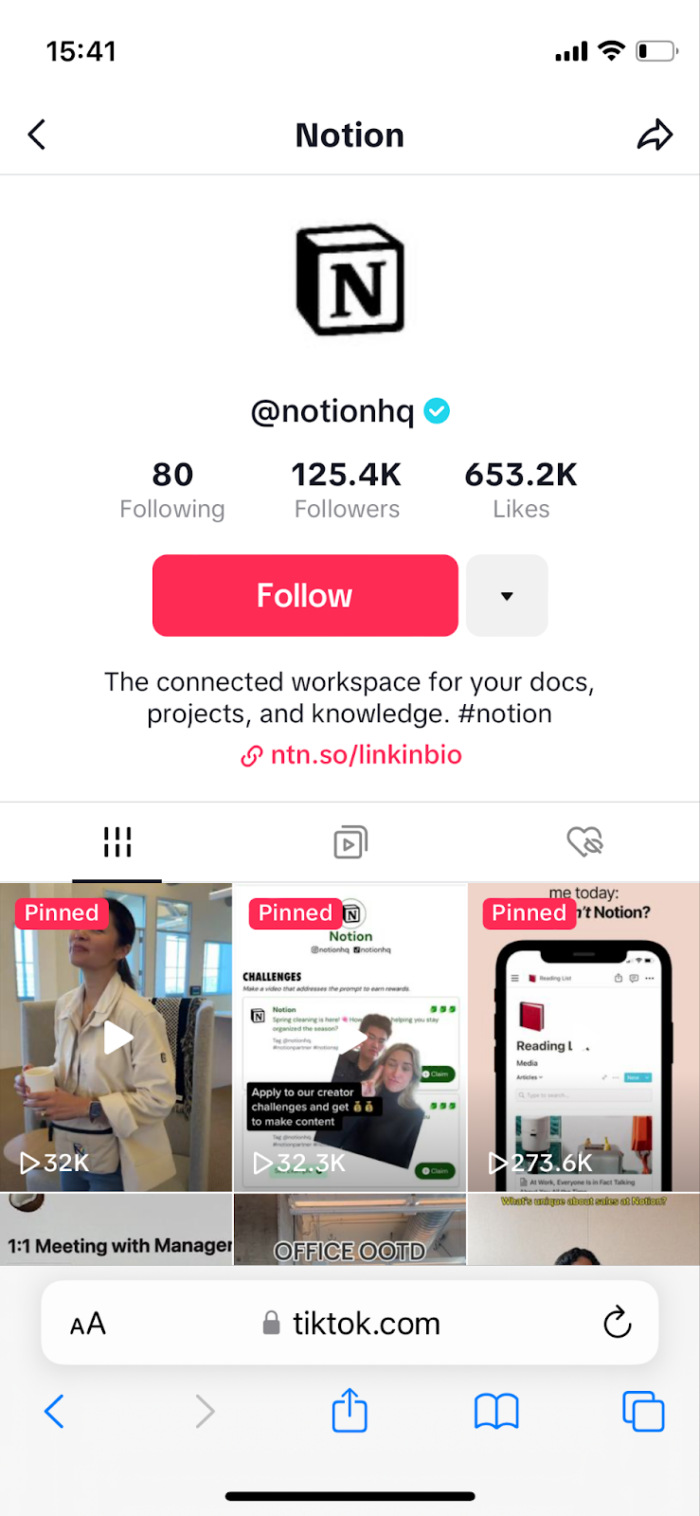
Capitalize on the popularity of short-form video by integrating them into your marketing strategies. There are several strategies you could use:
- Create how-to videos for your product or services
- Encourage user-generated reviews
- Showcase new product features
- Create an industry-focused meme account
Personalization Takes Center Stage
Personalization is so much more than a buzzword in 2024. Given the influx of AI-generated content, personalization is arguably the most important trend on this list.
Why?
The reason is simple: Personalized content is the best way to offer genuine value to readers.
This isn’t about using dynamic content to personalize your website experience for every user. It’s about adding your personal touch to every piece of content you create. When anyone can use ChatGPT to create a bland 1500-word article, content with a human touch will stand out.
So, how can you create personalized content in 2024?
The first step is to talk about your own experiences. Share your unique experiences on the topic, even if it’s something as simple as an anecdote.
Food bloggers are a fantastic example of how to do this effectively. Almost every recipe on the Cookie and Kate website has a short personal introduction before the recipe explaining what she loves, how she created the recipe, or how you can serve it:
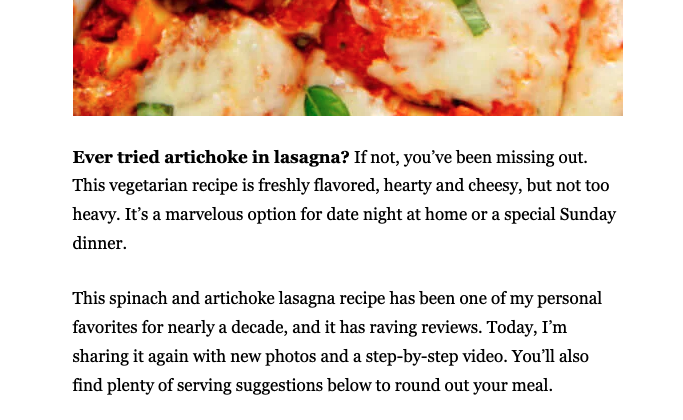
Next, infuse your content with your product or service. Don’t just write a 101-level blog post. Show readers how they can solve their problems using your product. Include as many screenshots as you can and make your content as actionable as possible.
Not only will this make your content stand out from AI-generated drivel, but it should also increase your content’s conversion rates.
Finally, include the opinions of experts, whether those are people on your team or from the wider industry. Doing so can add weight to your arguments and boost your E-E-A-T score.
2024 Content Marketing: The Predictions
Now it’s time to get out my crystal ball and look ahead to the future. I predict the following four content marketing trends will take hold in the year ahead.
Catering to SGE Will be Essential
Search engine result pages are changing. Google is experimenting with SGE or Search Generative Experience, which adds a ChatGPT-like interface to the top of the results page that answers the user’s query and allows them to ask further questions.
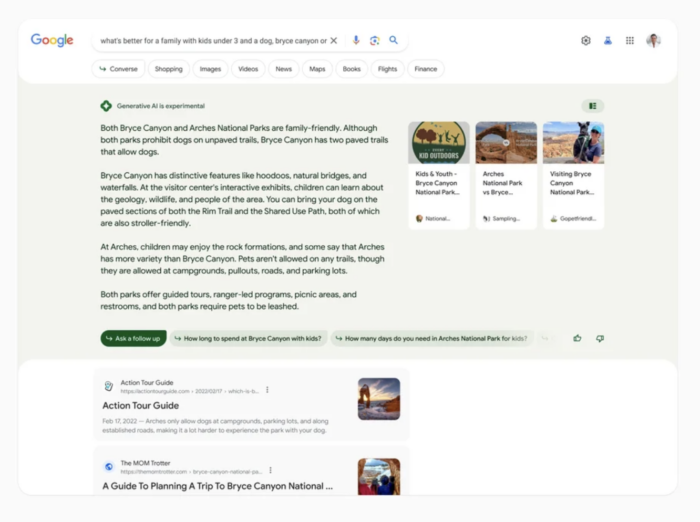
SGE will obviously change the way people interact with Google. Experts tend to agree that clickthrough rates will be down, ads will be less common, and users will ask even more long-tail queries. I’ve also written extensively about what people are getting wrong about SGE.
But what does it mean for content marketing? Well, if you want to protect your clickthrough rate, getting featured in the SGE results bar using the following tactics will be essential:
- Prioritize E-E-A-T. Yes, I’ve mentioned it a lot in this article, but the importance of experience, expertise, authority, and trust is so crucial in a generative AI world.
- Use structured data. Schema markup and other forms of structured data can make it easier for Google to understand your website.
- Optimize for the long tail. The deeper you get into the weeds of a topic, the more likely it will be for Google to reference your website.
At the same time, make sure the rest of your website is optimized for conversions. If traffic does decline as a result of SGE, you need to make sure you convert as many visitors as possible.
AI Will Find Use Beyond Pure Content Generation
AI isn’t just a tool for content creation. It’s actually much more suited to optimizing almost every other aspect of the content creation process.
Don’t believe me? My team did the research.
We found that although most marketers use AI to write their content, human-written content ranked higher 94.12 percent of the time.
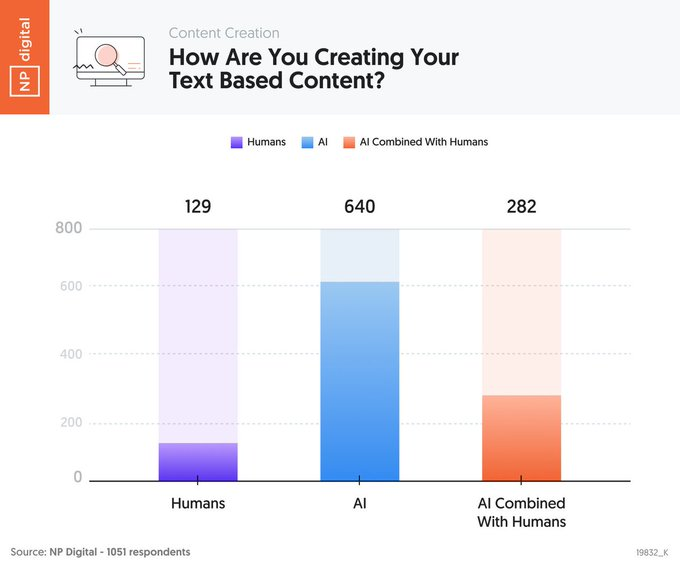
We even double-checked this by running an experiment with the help of 68 other sites to see what percentage of their traffic comes from AI-written content.
Here are the results:
- The average AI-written article had 52 visitors a month.
- The average human-written article had 283 visitors a month.
That’s a 5X improvement!
So instead of using AI to write your content, use it for research instead. It’s a great tool for analyzing huge amounts of data from several sources, condensing it down into something that’s actually usable.
I can feed it dozens of reports and studies, for example, and get it to summarize the findings into an article outline or incorporate them into a table that I can include in my finished piece.
Trust Will Be More Essential Than Ever
Do you want to read something written by a robot? I know I don’t. As I said above, most AI content lacks depth and nuance. So what happens to brands that continue to pump out generic content? They lose the trust of their audiences.
In a post-AI world, trust is going to be everything. The more you can build trust with your audience by proving that a real human with real experience wrote your content, the more valuable your brand will become.
Your authenticity won’t just help you forge strong relationships with your audience, it should improve your content marketing ROI, too.
For one, I believe Google will reward content that meets E-E-A-T guidelines even more in the future. But even if your authentic content doesn’t get higher rankings, it should convert users more frequently. At the end of the day, users will trust brands that create genuine content much more than companies that churn out AI fluff.
Content May Be Moving Social-First
I can imagine a future where marketers don’t focus on blogs and websites first when creating content but on social media instead. You’ve probably noticed this trend already starting to happen if you spend time on X (formerly Twitter), LinkedIn, or even TikTok.
In the past, brands would have tried to redirect visitors back to their websites. But this rarely happens now. Instead, brands are trialing a social-first approach where content is unique to specific social platforms.
Here’s an example from my digital marketing agency, NP Digital. Rather than write a blog about citation building for local SEO, we’ve condensed everything you need to know into a single LinkedIn post, complete with an expert quote and a series of tips.
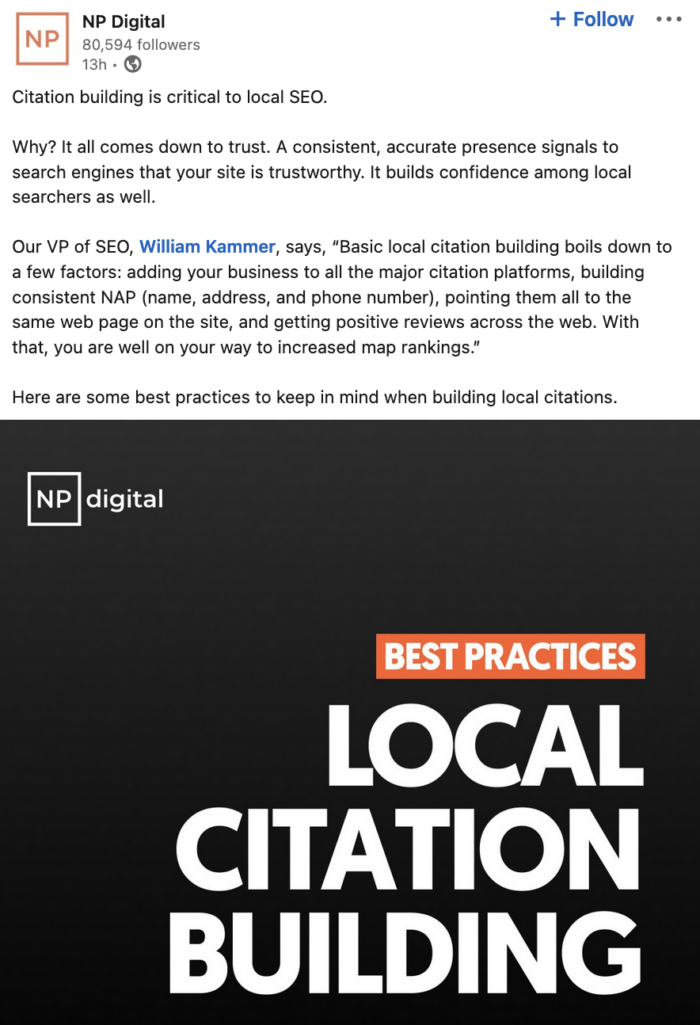
There are plenty of benefits to this approach. It’s often easier and cheaper to create social media content, for one. But it also lets brands engage with their audience in real time and develop the kind of persona that their target audience can trust.
This doesn’t mean blogs and whitepapers are irrelevant, far from it. But it does mean that short-form written content like LinkedIn posts will start to be taken much more seriously.
FAQs
Why is content marketing booming?
Content marketing is all about engaging readers rather than selling to them—and that’s exactly why this marketing tactic is booming. By providing useful, relevant content, brands can establish themselves as thought leaders in their industry and build a customer-centered reputation.
How is content marketing evolving?
A couple of years ago, content marketing meant creating the longest, most comprehensive, and most in-depth article possible. Today, content marketing is much more nuanced. Shorter blog posts are becoming much more common, as are short-form videos and social media-specific content like LinkedIn posts. In other words, it’s not just blogs and ebooks anymore.
How does AI change the content marketing landscape?
Artificial intelligence is revolutionizing the content marketing landscape by allowing brands to create content faster and cheaper than ever before. The web is being flooded with mediocre content, but it does mean brands that create truly useful content will stand out even more.
AI is also being used throughout the content marketing process. This includes large-scale personalization efforts, content research and inspiration, outlines, and even drafts. There’s no right way or wrong way to use AI in your content marketing process—just as long as you create exceptional content as a result.
What does the future of content marketing look like with SGE?
SGE is going to change the way people interact with Google. Rather than reading one or several articles, there’s a good chance they’ll have a conversation with the SGE chatbot, instead. So, if you want to guarantee your brand gets seen, you’ll need to optimize your content so that Google features it as a resource in SGE.
That means targeting more long-tail keywords, adding schema markup to your content, and optimizing for snippets. It may also encourage marketers to diversify their content, creating videos, images, and e-books that can get picked up and included by Google in its search results.
Conclusion
How do you think I did? While you probably didn’t need me to tell you that AI-generated content and short-form videos are industry trends, I think the power of personalization and branding flies under the radar.
I’ve also done my best to predict how I think content marketing will change in the year ahead. But this is by no means an exhaustive list. Trends like shorter blog word counts, first-party data compliance, and private and niche communities could all impact content marketing in 2024 and beyond.
Have I missed anything? Let me know your trend predictions in the comments!

See How My Agency Can Drive More Traffic to Your Website
- SEO - unlock more SEO traffic. See real results.
- Content Marketing - our team creates epic content that will get shared, get links, and attract traffic.
- Paid Media - effective paid strategies with clear ROI.
Are You Using Google Ads? Try Our FREE Ads Grader!
Stop wasting money and unlock the hidden potential of your advertising.
- Discover the power of intentional advertising.
- Reach your ideal target audience.
- Maximize ad spend efficiency.

